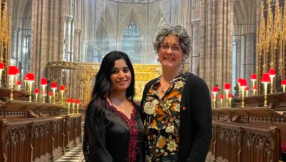"Love is patient, love is kind. It does not envy, it does not boast, it is not proud. It does not dishonour others, it is not self-seeking, it is not easily angered, it keeps no record of wrongs. Love does not delight in evil but rejoices with the truth. It always protects, always trusts, always hopes, always perseveres" (1 Corinthians 13: 4-7).

No matter how many fairy lights, string quartets, organza bags and blushing bridesmaids there are, it seems that no wedding is complete without someone standing up and reading 1 Corinthians 13. This excerpt from a letter written to a church halfway between Sparta and Athens brings a bit of true Greek wedding style to the most traditional of marriage ceremonies. They have become some of the most quoted verses of the Bible and resonate with many marrying couples, whether Christians or not. These beautiful words, are the ones we persistently choose to attach to one of the most important days in their lives.
There is a good reason for this. They describe the way we want to be loved. We want someone to love us patiently and kindly, without envy, boasting or pride. We want someone to love us sacrificially, unconditionally and unfailingly.
We rightly set the bar high on these important occasions. Yet we are also aware that the words alone cannot guarantee a lifetime of this idealised picture of love. Too many couples who start off so well-intentioned and hopelessly in love end up lovelessly hopeless, with talk of divorce and custody rights. There is a huge gap between the promise of these words and the reality of our lives. But there is hope.
Paul's inspiring words occur in a letter addressed not to a starry-eyed marrying couple, but to a quarrelling church. I wonder if they would be so popular if the original context was understood. The church was racked with dispute, disunity and disintegration. It was neither loving nor kind. The letter begins by addressing the divisions in the church, with different factions arguing over which leader to follow. This was not a church that 'does not dishonour others'. There was blatant sexual immorality including one man sleeping with his father's wife (1 Corinthians 5: 1-13) and others visiting prostitutes (6: 12-20). The congregation kept a record of wrongs to the degree that some church members were even taking their grievances to court. They were impatient, jumping the queue in communion and not saving food for those behind them (1 Corinthians 11). They were unkind, criticising each other for what they were eating outside of the church (1 Corinthians 8-11). Paul writes boldly about the characteristics of love precisely because the people he was writing to didn't seem to get it one bit.
Such was the reality gap between the life of the Corinthian church and God's intention for his people that Paul calls these Christians to live out a completely different and radical love, even in the middle of the hopeless messiness and lovelessness. This is where these verses remain significant. In the midst of the tension and the conflict, where impatience and unkindness are rife, these verses call us to a different kind of attitude.
I have visited a lot of churches all around the globe and it is rare to find people who bear testimony to an extremely patient and self-sacrificial love. It is much easier to find those whose actions blatantly contradict it. I have seen just as much bullying, manipulation, and false accusations in the church as anywhere – or what can be worse, a detached coldness, a lack of welcome, whispering behind people's hands, a nagging feeling of discontent.
Sadly, the same can be true in Christian marriages. Many seem to be stuck in the same sort of resentments and selfishness and betrayals that blight those relationships of people who do not claim Christian faith, or indeed any faith at all.
What the love paradox shows us is that even in the best churches and, for that matter, the best marriages, there is a disconnect between what we are called to be and what we actually are; between the lives that God deserves from us and what we actually give him; between the character of God and the character of his people. Even in the earliest churches – those that were closest chronologically to the time of Christ and the outpouring of the Holy Spirit that led to the miraculous explosion of the Church across the Near East, and those which were overseen by an apostle – there was already this falling short. This church in Corinth that had so much wrong with it demonstrates such a degree of dysfunction in its communal life that it must surely quash the myth that dysfunction won't be seen in our churches today.
So how are we to navigate the discrepancy between hope and disappointment, between the promise and the reality?
Before Paul closes this first letter to the Corinthian church, he has one major lesson to set out and apply to its messy life. It is this theme that can help us to find at least some resolution for the love paradox. Paul began his letter by exploring the significance of the crucifixion of Jesus (1 Corinthians 1: 13-22) and he ends with a reflection on the significance of Jesus' resurrection. Paul and the people of the Corinthian church can be under no illusion about their problems, and in this context he shows us that the resurrection of Jesus is the key to living in the place of the hopelessly hopeful.
On its own, Jesus's death on a Roman cross was nothing unusual. Thousands were killed in this cruel manner, a gory visual aid to show the power of the empire and the futility of resistance. But only Jesus was raised from the dead. The resurrection shows that Jesus' willing self-sacrifice was effective and that our sins really have been forgiven. But that happened 2,000 years ago and we are still waiting for God to finally come good on his promises. The hope that was on offer back then – those rooms in his Father's house, that kingdom which was so near, the end to their suffering – feels like a rather hopeless cause after all this time. The resurrection paradox, like the love paradox, seems to disprove, not prove, the promises God makes.
Paul uses a powerful metaphor of 'firstfruits' to help us understand why the resurrection resolves the paradox of continuing hope with continuing disappointment. The 'firstfruits' was the first and best of the crop, which under Jewish law was offered to God as a thankful recognition for the long-awaited taste of the harvest they had received; but also as a recognition of trust as they waited for the remainder of the harvest. The idea of 'firstfruits' implies 'later fruits', operating as a guarantee for the fullness of the harvest to come.
Similarly, the resurrection of Jesus is a foretaste and guarantee of the resurrection of the whole of creation. It is God's promise of restoration of the whole universe, and yet it deliberately leaves us hungry for more. The high calling of 1 Corinthians 13 provides us not only with a taste of true love in the midst of heartache and cruel relationships, but the reminder of the perfect love that is to come. The love paradox reminds us to keep loving each other not just despite the difficult relationship issues that we are surrounded by, but because of them. Those fragments of patience, justice, beauty, healing, restoration, selflessness, protection that we can bring to our relationships are firstfruits – a taste of the future. And this is not just for our own personal benefit, or even for the benefit of humanity, but for all of creation awaiting the promise of restoration.
Christians believe in resurrection as a way of life. We may not be very good at it, but with God's help, we try. We believe that God will one day answer the prayer that Jesus taught all of his followers to pray. One day God's kingdom will come, God's will will be done on earth as it is in heaven. We believe that the resurrected Jesus will return and that true love will win and last forever.
So the next time you are at a wedding and someone begins to read those words – don't let your eyes glaze over. Don't whisper to your neighbour, 'I give it a year.' Don't mouth along with your lips while your heart is impervious, but allow the high calling of love, in a world that so desperately needs it, to remind you again to always trust, always hope, always persevere.
Dr Krish Kandiah is the founding director of Home for Good a charity finding loving homes for children in need of fostering and adoption. This article is an adapted version of a chapter in his brand new book 'Paradoxology: Why Christianity was never meant to be simple', published by InterVarsity Press USA in February, 2017 (www.ivpress.com).













